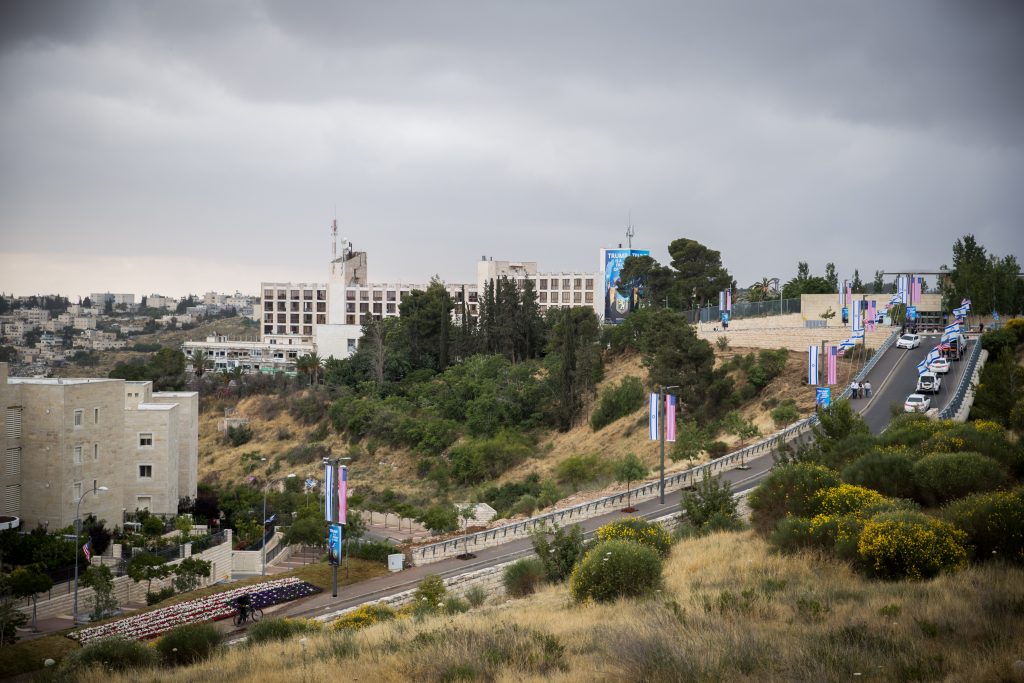Gaza, Embassies and Jerusalem – how should we respond as Christians?
During the last week we have all been confronted with powerful, emotional and contradictory images and video’s concerning Israel.
On 13thMay we saw thousands of Israeli’s in the streets of Jerusalem waving flags and generally having a wonderful time as Israel celebrated Yom Yerushalayim, in recognition of the reunification of Jerusalem in June 1967. From 13th-15thMay, over 2000 Christians from many nations – some of them descendants of Nazi war criminals – attended the March of the Nations in Jerusalem “to honor Holocaust survivors and to make a clear statement of solidarity and friendship with Israel – and against modern anti-Semitism”. And on 14thMay, the world watched as Israel celebrated its 70thbirthday, and the United States opened its new Embassy in Jerusalem. Two days later Guatemala followed suit and also opened its new Embassy in Jerusalem.
At the same time, we were all witnesses to the shocking photo’s and video’s at the Gaza border as thousands of Palestinian Arabs protested against the Israeli “occupation” demanding the right to “return”. Men, women and children stormed towards the fence. IDF soldiers opened fire. On Monday 14thMay, about 60 Palestinians were killed, and not a single Israeli was killed or injured. The world has reacted in outrage.
What are we to make of all of this? How should we respond as Christians?
These are not easy questions. We all feel emotionally torn. We want to support Israel and the Jewish people, but we also cannot condone the killing of innocent children, and we feel deep concern and alarm about the plight of the people in Gaza. Here are some suggestions.
1. Our attitude as Christians for Israel towards Israel and the situation in the Middle East
As Christians for Israel, we support (and we encourage Christians to support) the return of the Jewish people to the land, and the State of Israel as an expression of the restitution of the Jewish nation. We do that, because we believe it is our Biblical responsibility to do so. For millennia, following the various attacks and destructions of Jerusalem by the Assyrians, Babylonians and Romans, the Jewish people have lived (often as second-class citizens) in the nations. God has promised in the Bible that He will bring them home, and we believe that is exactly what He is doing.
Organizations like Christians for Israel are often accused of being biased, ignoring injustices in Israel, and giving Israel a blank check to do whatever it likes. That is an understandable perception. It is true that we do support Israel and the Jewish people. We are often responding to what we perceive to be unfair or incorrect accusations against Israel, and this sometimes leads us to make statements that are strongly in favor of Israel.
However we fully realize that Israel is not perfect. Israel makes mistakes, and there are also circumstances in Israel that are not the way we would like to see them.(Examples include the high abortion rate in Israel, and individual cases in which Palestinian Arabs are treated unfairly).
But it is not our task to point the finger at Israel and tell Israel how it should run its own affairs.
- First of all, it is all too easy to point the finger. We are not there on the ground, so we don’t know or understand all the issues. The Middle East is a complex place, and most of us Westerners simply don’t understand the cultural, religious, and historical environment within which Israel has to act.
- Second, Israel is an open and democratic society based on the rule of law. It has a government that has been elected to govern the country, and it has institutions and systems for protection of the rights and interests of minorities. We should support the government of Israel in its endeavors to build an open, just and safe society within which all of its citizens (Jews and non-Jews) can flourish.
- Third, even when we may disagree with things that happen in Israel, we should be slow to reach an opinion, and careful in our choice of words. Yes, we can and should speak strongly to our friends and contacts in Israel, and where necessary not be afraid of criticizing specific acts that we may disagree with and encouraging them to act differently. Sometimes it may even be appropriate to publicly express our disagreement or concerns. But publicly “attacking” or “condemning” Israel (or anyone else) is not appropriate, and usually does not work.
2. The “occupation”
It is important to understand the history of the territories now generally known as the “Occupied Palestinian Territories”.
- From 135CE to 1918CE, “Palestine” was under successive foreign rule.
- In 1920, the international community agreed that a Jewish homeland should be established in Palestine (San Remo resolution and Mandate for Palestine), as part of a broad settlement of the territories of the Middle East intended to give the peoples of the region self-determination.
- The Arabs resisted the creation of the Jewish homeland, and when the State of Israel was declared on 14thMay 1948 (on the eve of British withdrawal from the Mandate), the Arabs immediately attacked with the intention of “driving the Jews into the sea”. The result was a cease-fire in 1949, in which Jordan occupied “East Jerusalem” and the West Bank, and Egypt occupied the Gaza Strip.
- In June 1967 Israel took back control (unexpectedly) of the Sinai, Gaza Strip, “East Jerusalem”, West Bank (Judea and Samaria), and Golan Heights. It did so in a defensive war, and therefore is entitled to hold on to control of those territories until such time as it reaches a peace treaty with the aggressors.
- Since 1967 Israel has entered into Pease Treaties with Egypt (1979) and Jordan (1994). It has given away control of the Sinai (to Egypt) and Gaza Strip (to the Palestinians), and it has entered into the Oslo Agreements in an attempt to reach a peace agreement with the Palestinians.
- Israel has a legitimate claim to territorial sovereignty over East Jerusalem and the West Bank. It has not been established under international law that these territories “belong” to the Palestinians.
- The sooner a resolution is reached in which Israel’s rights to territorial integrity and political independence are guaranteed, the security fence is dismantled, and the Palestinian Arabs can have a decent life, the better.
We cannot go into all the details here, but we do notargue that Israel’s military administration of the West Bank is a desirable situation to be continued. The military regime was only ever intended to be a temporary situation pending a peace agreement. Israel’s position has always been: we will keep control of the West Bank until we can negotiate peace.
The question is – why has it not been possible for Israel and the Palestinians to reach a peace agreement? There are many reasons for that, which we cannot go into here. But one of the main reasons is that the Palestinian Arab leadership (read: PLO) is dedicated to the destruction of the Jewish State. It is hard to reach peace with someone who hates you, denies your right to exist, and is committed to your destruction.
In the meantime, Israel is faced with an almost impossible dilemma: to manage a country that is comprised of Jewish immigrants from over 100 countries, and a significant minority of non-Jews of various backgrounds, while protecting its borders against the constant threat of attack from its neighbors who threaten to annihilate it, especially Iran and its proxy H’zbollah in Syria and Lebanon. At the same time the world expects it to look after the well-being and human rights of the Palestinian Arabs in the areas under Israeli control, while the Palestinian leaders are supporting terror and inciting hatred against Israel. In this context it is a miracle that Israel not only survives, but that it even manages to function as a more-or-less democratic society.
3. The humanitarian crisis in Gaza
The situation in Gaza is a humanitarian crisis of enormous proportions. Approximately 1.8 million Palestinian Arabs are living in what has effectively become a prison, under the control of a terrorist regime whose sole purpose in life is to kill Jews and destroy the State of Israel. There is massive unemployment, lack of educational institutions, denial of basic freedoms such as the right to free speech and freedom of worship, and limited food and water.
The question is – who is responsible for this situation? And who is responsible for helping the people of Gaza?
- The PLO and the Palestinian Arabs themselves:first and foremost, the Palestinian Arabs themselves are responsible for their own situation. They are not the victims, but have contributed to their situation, and are in a position to shape their own future.
- Israel:Because Gaza is located between Egypt and Israel, and Israel controls the borders, Israel definitely has a responsibility to make sure that humanitarian aid reaches the people of Gaza. But Israel cannot be held responsible for the fact that the economic and social conditions are so bad in Gaza.
- Egypt:took control of Gaza in 1948/1949, and has the capacity to assist the people of Gaza. Egypt also has control over the border with Gaza.
- The other Arab nations in the region:rejected the 1947 UN Partition Plan, which could have resulted in an Arab Palestinian state. Egypt, Syria, Jordan, Iraq and Lebanon attacked Israel on 15thMay 1948, resulting in the Palestinian refugee crisis. This was made worse by the Six Day war in June 1967, which was also triggered by Arab aggression against Israel. These nations should be held accountable for the plight of the Palestinian Arabs.
- The United Nations:the nations that insist on Palestinian statehood, and that promoted Israel’s withdrawal from Gaza, are also responsible for the outcome of their policies.
4. The “March of Return”
This was not a peaceful demonstration, as Luke Akehurst wrote the following in The Times of Israel:
“We now know, from an interview with Hamas official Salah al-Bardawil, that 50 of the 60 dead were Hamas members. Islamic Jihad claim a further 3. Another Hamas leader, Mahmoud Al-Zahhar, gave a TV interview the day before the bloodshed saying Hamas was “deceiving the public” when it used the phrase ““peaceful resistance” as it was “bolstered by a military force and by security agencies”.
Details are emerging of ten groups that tried to blow holes in the border fence with IEDs, of another group of eight terrorists that were in a gun and grenade battle with Israeli commandos. Gazan Facebook pages urged participants in the protests to “Bring a knife, dagger, or handgun”. Al-Bardawil described Monday not as a protest or even a riot but a “battle”.
The clashes could have led to mass casualties if the border had been breached and terrorists had reached the kibbutzim I’ve visited in recent years, one of which is just 400 metres beyond the border.
This wasn’t the indiscriminate massacre of civilians presented to the world on Monday. This was a case of highly trained IDF soldiers, with very clear rules of engagement, with use of live fire as the very last resort, stopping terrorists from using the chaos and confusion of a huge demonstration and smaller outbreaks of rioting as cover to infiltrate Israel with the intention of killing civilians.”
5. Did Israel act in breach of international law?
Israel is a state. Under international law, every state is entitled to protect its borders.
This does not entitle the State of Israel to use indiscriminate or disproportional force. It must ensure that actions are necessary and limited to achieving legitimate military objectives.
The question whether Israel complied with international law in managing the March of Return is complex, and requires a detailed understanding of the specific factual situation. It is not possible to make a judgment on these issues based on reports in the Western media. Given the role of Hamas, there can be no doubt that Israel was entitled to use force to confront the “demonstration”. This would justify taking out terrorists. But whether non-combatants should have been killed requires a detailed investigation of the facts in each specific case. Israel will no doubt conduct an internal investigation into what happened on the Gaza border, as it has done after every conflict with Hamas over the last decade.
6. What can/should we do as Christians outside Israel?
In the context, Christians in the nations have a responsibility to respond in a Biblical way.
- Above all, we should pray for the situation in and around Israel. Pray for the Jewish people, and for all those who live in the land. Pray for the nations surrounding Israel. Pray for the ordinary citizens of those nations, many of whom are living under regimes that promote death and hatred, and deny human dignity. Pray for our own governments, that they may act wisely and compassionately. Pray for the Peace of Jerusalem, and for the coming of the Prince of Peace.
- Be informed. We must investigate the facts, and ensure we are well informed. Understand the background to the conflict. Understand the broader context, and the difficult dilemma’s facing Israel, and all actors in the region.
- We should encourage our governments to understand the complexities of the situation, respect Israel’s rights to self-defence, look for constructive solutions to the underlying problems, and respond with constraint.
Useful websites:






